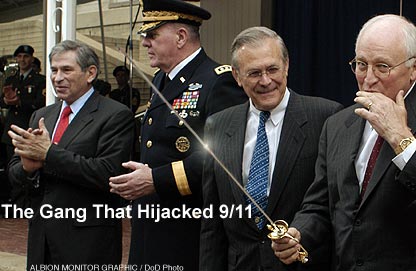

|
| by Randolph T. Holhut |
 |
|
|
(AR) --
We're
two years removed from that tragic September morning of death and destruction in New York, Washington and Pennsylvania.
As painful as that day was for Americans, little did we know that as the ash and smoke were rising from the pyre that was once the World Trade Center, there were people scheming to take advantage of the tragedy. Two years ago, few people had heard of a Washington-based neo-conservative think tank called The Project for a New American Century (PNAC). Few knew then about its plans for a global American empire or knew that its alumni -- Vice President Dick Cheney, Defense Secretary Donald Rumsfeld, Deputy Defense Secretary Paul Wolfowitz, Cheney's chief of staff Lewis Libby and former Defense Policy Board chairman Richard Perle, among them -- had considerable power in the White House. In the fall of 2000, PNAC issued a report entitled "Rebuilding America's Defense: Strategies, Forces and Resources For A New Century." The PNAC report was mostly a rehash of an earlier strategic proposal drawn up for the Pentagon by Libby and Wolfowitz in the early 1990s. Libby and Wolfowitz envisioned a world where the guiding principle of U.S. foreign policy is establishing permanent U.S. military and economic dominance over the Persian Gulf region and any other part of the world where U.S. interests lie. Former President George H.W. Bush and the Pentagon rejected the Libby/Wolfowitz report as being too radical. But their ideas never went away. All that was needed was more fertile ground for them to grow. That came with the Republican theft of the 2000 presidential election, which put Cheney, Rumsfeld, Wolfowitz and several other PNAC alums in charge of American foreign policy. The PNAC vision of a Pax Americana in the Middle East -- starting with the ouster of Saddam Hussein and the establishment of an American protectorate in Iraq -- might have remained merely a vision. But in the worst case scenario of what happens when ideologues get an opportunity to put their plans into action, the Sept. 11 attacks gave the neo-conservatives the chance they had been waiting for. Within hours of the collapse of the World Trade Center, the talk within the inner circle of the Pentagon and the White House was of invading Iraq. Even after the responsibility for the Sept. 11 attacks was squarely placed on Osama bin Laden and al-Qaeda, the focus in the White House remained on Iraq. That focus would not waver, even as the Taliban were routed in Afghanistan. When President Bush gave his 2002 State of the Union speech, Iraq was front and center in the "Axis of Evil," and the propaganda campaign to convince people of the need to invade Iraq began in earnest.
The Bush administration eventually adopted the PNAC strategy as its own. Last fall, it presented to Congress "The National Security Strategy of the United States," the official foreign policy blueprint of the Bush administration. The 33-page document outlined how the U.S. wouldn't allow any other nation to catch up with its huge advantage in military power and advocated a policy where the U.S. "will not hesitate to act alone, if necessary, to exercise our right of self-defense by acting preemptively." Those last 17 words became the guiding principle behind the Iraq invasion. The rest of the world figured it out quickly and opposed the Bush administration's war plans. The global opposition only intensified the desire of the neo-conservatives to dispense with the United Nations and go it alone in Iraq. While many feared chaos in Iraq, the PNAC crew -- which had founded The Committee for the Liberation of Iraq and pushed Iraqi exile Ahmed Chalabi as the eventual replacement for Saddam -- maintained that the Iraqis would greet U.S. and British forces with flowers and ecstatic celebration. Iraq would become a beacon of stability and democracy in the Middle East and Iraqis would be forever grateful to the U.S. for the removal of Saddam Hussein. This was the plan that was set in motion by the Sept. 11 attacks. Two years later, we now clearly see what happens when foreign policy gets hijacked by far-right ideologues who are totally convinced of the righteousness of their actions. The invasion of Iraq went relatively smoothly. The occupation has been anything but smooth. This is a direct result of the total reliance on the overly optimistic and unrealistic ideas of the PNAC folks in the Bush administration. Chalabi was instantly rejected by Iraqis. Anyone associated with the U.S. occupation has been killed or targeted for death. A civil war with U.S. troops caught in the crossfire seems to be what's ahead in Iraq. The best possible outcome from what we've seen happen to this nation in the two years since 9/11 would be that Americans would not allow something like this to happen again. Too many of us allowed our fears of another 9/11-style attack cloud our judgment. Too many of us allowed our leaders to stampede us into an unnecessary war. Too many of us allowed them to lie with impunity about the need for an immediate, unilateral U.S. invasion of Iraq. Too many of us allowed the silencing of those who disagreed with the Bush administration's plans. And too many of us didn't realize how easily our democracy could be corrupted by a small group of scheming men. The tide is starting to turn, though. As more people see through the tangled web of lies spun by the Bush administration since 9/11 and realize how a national tragedy could so ruthlessly exploited for political and financial gain, the more unlikely it is that we'll see another four years of a Bush presidency.
Albion Monitor
September 8, 2003 (http://www.albionmonitor.net) All Rights Reserved. Contact rights@monitor.net for permission to use in any format. |